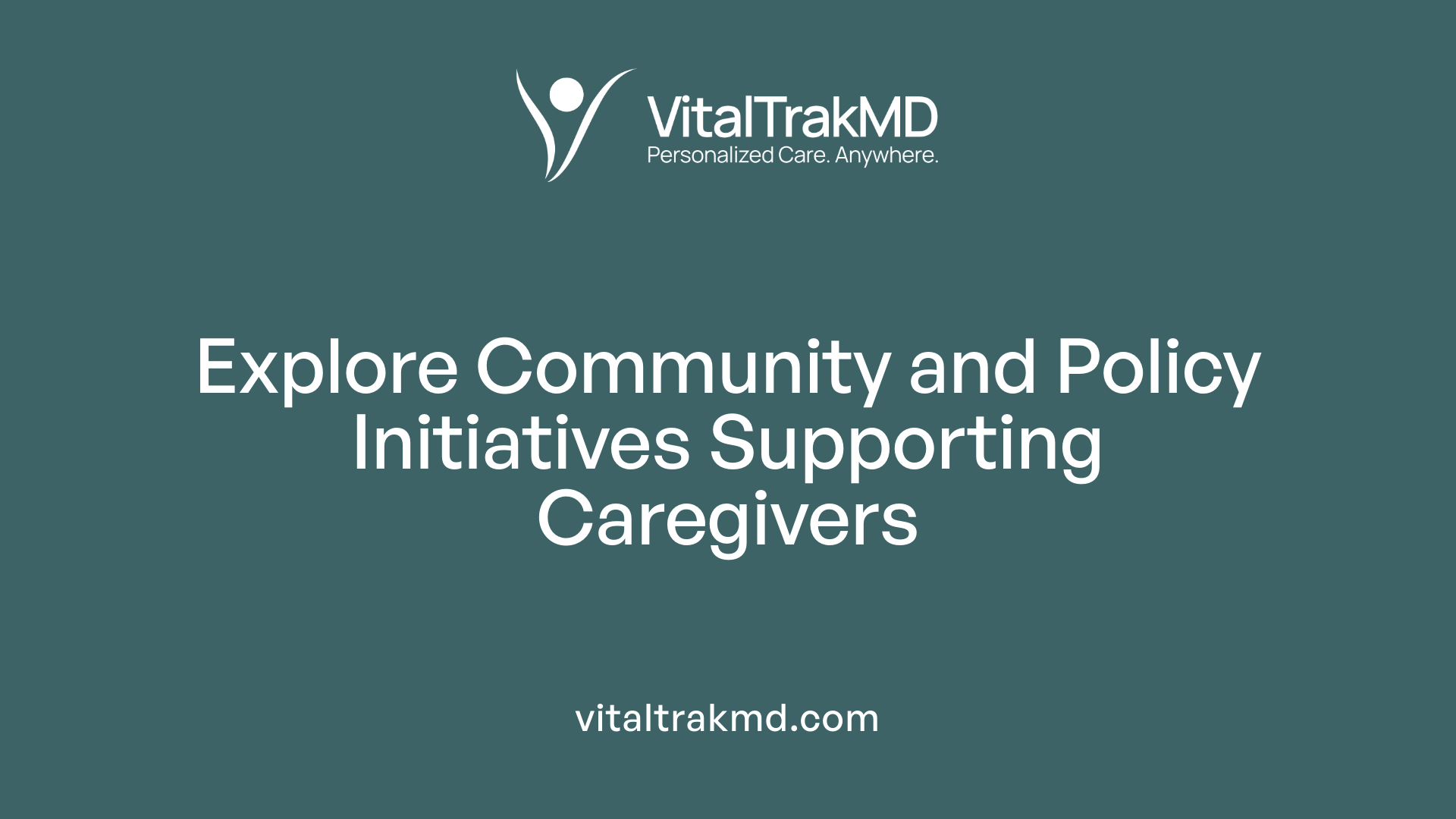From Overwhelmed to Empowered: Hybrid Support for Caregivers

Understanding the Critical Needs of Caregivers Today
As nearly 50 million Americans care for aging relatives or loved ones with chronic conditions, the risk of burnout and stress has escalated. The emotional, physical, and financial toll on caregivers demands comprehensive, innovative support systems. Hybrid models—integrating in-person, online, and community-based strategies—offer promising pathways from overwhelm to empowerment. This article explores multifaceted approaches to bolster caregiver well-being, emphasizing the vital role of policy, community, workplace, and technological supports.
Recognizing and Addressing Caregiver Burnout and Stress

What are the signs and symptoms of caregiver burnout?
Caregiver burnout is characterized by a mix of physical, emotional, and behavioral signs. Physically, caregivers may experience ongoing fatigue, sleep disturbances, headaches, or recurring illnesses. Emotionally, feelings of hopelessness, irritability, sadness, and emotional exhaustion are common. Behaviorally, caregivers might withdraw from social activities, neglect personal needs, and experience mood swings or irritability.
Physical health issues such as frequent colds, appetite changes, and increased stress-related health problems often signal burnout. Recognizing these signs early is crucial, as it allows caregivers to seek help before experiencing severe health consequences or decreased capacity to care effectively.
What measures can support family caregivers in providing effective care?
Support for caregivers extends across community programs, educational resources, respite services, and emotional support networks. National initiatives like the National Family Caregiver Support Program provide counseling, training, and temporary relief through respite care, helping caregivers recharge.
Moreover, specialized programs, such as those offered by the VA, give practical assistance including guidance on navigating healthcare systems and accessing financial aid. Local agencies often facilitate connections to support groups, training sessions, and respite options, empowering caregivers to sustain their caregiving role with confidence.
Implementing these supports can reduce stress, improve health, and enhance the quality of care provided. Caregivers who receive proper support are better equipped to manage their responsibilities and maintain their well-being.
How do caregiver stress and mental health affect care quality?
Elevated stress levels and poor mental health can significantly impair a caregiver's ability to provide high-quality care. High stress often results in reduced patience, inattentiveness, and emotional withdrawal, all of which can negatively impact the person receiving care.
Furthermore, chronic stress and mental health issues can weaken the immune system, lead to physical health decline, and cause fatigue—factors that diminish a caregiver’s capacity for consistent and attentive care.
By actively addressing mental health concerns through professional counseling, social engagement, and self-care practices, caregivers can restore their resilience. This not only benefits their health but also ensures that they can deliver attentive, compassionate, and effective care to their loved ones.
Community and Policy Solutions for Caregiver Well-being
 Supporting those who care for loved ones is a crucial aspect of ensuring their mental, social, and emotional health. Numerous programs and policies at government and community levels have been developed to provide relief and resources for caregivers.
Supporting those who care for loved ones is a crucial aspect of ensuring their mental, social, and emotional health. Numerous programs and policies at government and community levels have been developed to provide relief and resources for caregivers.
Nationally, initiatives like the National Family Caregiver Support Program (NFCSP) serve as a significant resource. The NFCSP offers comprehensive support services such as counseling, caregiver education, and respite care, which help reduce stress and prevent burnout. Additionally, the Department of Veterans Affairs (VA) provides specialized services, including support groups and caregiver training, tailored specifically for military families and veterans.
Medicaid programs in many states also reimburse for caregiver services, including in-home support and counseling, further easing the burden on families. Local agencies work diligently to connect caregivers with community-based resources, benefits counseling, and personalized support plans. These services aim to empower caregivers with the tools they need to provide sustainable and effective care.
Workplaces play a vital role in promoting caregiver well-being. Employers can support caregivers by offering flexible work arrangements, such as adjustable schedules, telecommuting options, and caregiver leave programs. These workplace policies help reduce stress, improve job retention, and foster a more supportive environment.
Furthermore, many organizations partner with caregiver support networks and advocacy groups to enhance the resources available to employees. Initiatives like mental health support, caregiver resource guides, and peer support programs are increasingly incorporated into corporate wellness strategies.
In conclusion, a combination of federal programs, local resources, and workplace policies creates a comprehensive safety net for caregivers. These efforts not only alleviate immediate stress but also promote long-term sustainability and emotional resilience among caregivers.
| Support Type | Examples of Programs | Benefits | Additional Notes |
|---|---|---|---|
| Federal & State | NFCSP, VA caregiver services, Medicaid reimbursements | Financial aid, training, respite, counseling | Support for diverse caregiver needs |
| Community & Local | Support groups, benefits counseling, home support | Emotional relief, practical assistance | Tailored, accessible resources |
| Workplace Policies | Flexible schedules, telework, caregiver leave | Reduced stress, increased retention | Promotes a healthy work-life balance |
| Advocacy & Partner Initiatives | Caregiver networks, employer partnerships | Enhanced resource availability | Broadens access to support |
Searching for more information about policies and programs supporting family caregivers can yield additional insights into available services and eligibility criteria.
Leveraging Technology for Hybrid Caregiving Support

What online or hybrid support mechanisms are available for caregivers?
Digital platforms today offer a wide array of support options tailored for caregivers. These include online support groups, educational webinars, counseling services, and comprehensive resource portals. For instance, organizations such as the Alzheimer's Association and the VA provide virtual distress relief sessions and webinars that focus on caregiving challenges. These platforms foster community, allowing caregivers to share experiences, seek advice, and access professional support from home.
The advantage of virtual and hybrid models is their accessibility. Caregivers can participate regardless of their location or physical mobility constraints. This connectivity ensures they remain engaged and supported, reducing feelings of isolation and enhancing their ability to manage caregiving responsibilities effectively.
How can caregivers recover from burnout?
Recovery from caregiver burnout requires intentional self-care and support. Engaging in healthy routines such as eating well, exercising regularly, getting sufficient sleep, and taking time for pleasurable activities is essential.
Support groups and counseling services available online or through hybrid formats can help caregivers process their emotions and share coping strategies. Utilizing digital stress management tools, including mindfulness apps and virtual therapy, can further bolster recovery efforts. Recognizing early signs of stress and seeking timely support are vital steps for preventing relapse into burnout.
What online or hybrid support mechanisms are available for caregivers?
Beyond support groups and counseling, caregivers have access to hybrid respite programs that combine in-person and virtual care options. These programs provide flexibility, allowing caregivers to take necessary breaks while maintaining continuity of care for their loved ones.
Educational webinars, virtual training sessions, and online resource portals provide ongoing learning opportunities, covering topics from medical management to legal planning. Such mechanisms empower caregivers with knowledge and emotional resilience, making complex care responsibilities more manageable.
| Support Mechanism | Format | Description | Benefits |
|---|---|---|---|
| Online Support Groups | Virtual forums | Peer-led groups for sharing experiences, moderated for safety. | Reduces isolation, fosters community |
| Webinars and Educational Content | Virtual/Hybrid | Live or recorded sessions on caregiving topics. | Continuous learning, skill enhancement |
| Virtual Counseling | Online platform | Professional mental health support accessible from home. | Emotional support, stress reduction |
| Hybrid Respite Programs | In-person/Virtual | Temporary relief combining physical and remote care options. | Prevents burnout, improves well-being |
Research indicates that integrating technology into caregiving support enhances accessibility and emotional well-being. Continued development of these digital resources is vital to meet the diverse needs of caregivers across the country.
Empowering Caregivers Through Education and Community Engagement
 Caregiver education series, support groups at senior communities, and community events play a crucial role in strengthening the support network for family caregivers.
Caregiver education series, support groups at senior communities, and community events play a crucial role in strengthening the support network for family caregivers.
Caregiver education programs often cover topics such as managing medical conditions, navigating healthcare systems, and developing effective communication skills. These classes help caregivers gain practical knowledge and confidence, reducing feelings of helplessness and stress.
Many senior living communities, including those operated by organizations like Watermark, offer support groups tailored for caregivers. These groups provide a safe space to share experiences, exchange advice, and find emotional support. They also facilitate connections with others facing similar challenges, which can significantly decrease feelings of isolation.
Community-driven initiatives, such as seminars, advocacy campaigns, and resource fairs, further bolster caregiver support. For instance, during National Family Caregivers Month, events like caregiver resilience celebrations and educational series promote awareness, recognize caregiver efforts, and disseminate vital resources.
Public awareness campaigns like #CaregiversConnect help to highlight caregiver contributions. These efforts aim to reduce stigma, increase understanding, and promote access to community resources and policy support.
| Program Type | Activity | Purpose |
|---|---|---|
| Caregiver classes | Workshops and seminars | Education, skill-building, stress management |
| Support groups | Regular meetings, both in-person and virtual | Emotional support, shared experiences |
| Community events | Fairs, awareness campaigns, advocacy rallies | Raising awareness, celebrating caregivers |
Participation in these activities fosters resilience, emotional well-being, and practical skills. They help caregivers feel appreciated, less isolated, and more equipped to handle ongoing caregiving demands.
Ongoing recovery from burnout depends heavily on engaging with these community resources. Such involvement encourages a sense of belonging and empowerment, essential for maintaining caregiver health and effectiveness.
Many of these programs and campaigns are accessible online, making it easier for caregivers with mobility issues or those living in remote areas to join and benefit from community engagement. This integration supports a comprehensive approach to caregiver well-being.
By actively participating in education and community initiatives, caregivers can build stronger support systems, improve their mental health, and sustain their caregiving roles more effectively.
Building a Supportive Ecosystem for Caregivers
 To effectively support caregivers, adopting a holistic approach that combines various support models is essential. This includes integrating health, social, and emotional services to address the multifaceted needs of caregivers.
To effectively support caregivers, adopting a holistic approach that combines various support models is essential. This includes integrating health, social, and emotional services to address the multifaceted needs of caregivers.
Many policies and programs pave the way for comprehensive support. For example, the federal RAISE Family Caregivers Act directs the development of a national strategy emphasizing person-centered care, caregiver education, and financial security. These initiatives are complemented by community partnerships that promote mental health services, address social isolation, and foster emotional resilience among caregivers.
Workplaces also play a vital role in caregiver support. Employers can implement flexible work schedules, caregiver leave policies, and Employee Assistance Programs. Such measures help reduce stress, prevent burnout, and maintain productivity, empowering caregivers to balance their responsibilities effectively. Advocacy for workplace support amplifies societal acknowledgment of caregiving challenges.
Moreover, hybrid and online support mechanisms expand access to essential resources. Support groups, educational webinars, and virtual counseling provide flexible options for busy or remote caregivers. These models ensure continuous caregiver engagement, regardless of location or schedule constraints, making emotional and practical support more accessible than ever.
In summary, fostering an inclusive environment that combines policies, workplace initiatives, and technological solutions creates a robust support ecosystem. This integrated approach helps caregivers maintain their well-being, sustain their caregiving roles, and remain connected to vital resources.
Moving Forward with Inclusive, Hybrid Support
Transforming caregiver support from fragmented to holistic requires embracing innovative hybrid models—combining policy initiatives, community engagement, employer support, and digital technology. Tailored programs addressing emotional, social, and practical needs empower caregivers, mitigate burnout, and elevate the caregiving experience. As society recognizes unpaid care’s value—valued at nearly $873 billion annually—investing in accessible, flexible, and compassionate support systems is vital. This shift not only benefits caregivers and care recipients but also fosters resilient communities committed to compassionate, sustainable caregiving in the evolving landscape of aging and chronic care.
References
- How to Recognize and Reverse Caregiver Burnout - sheraton.care
- Caregiver Stress and Caregiver Burnout - HelpGuide.org
- The holidays bring out - BCBSAL - Articles
- The Benefits of Support Groups for Older Adults and Caregivers
- Community News for Caregivers - November 2023
- The Caregiver Crisis - How Employers can Support Workers
- Caregiver Support Organizations & Agencies
- ECONOMIC IMPACTS OF PROGRAMS TO SUPPORT CAREGIVERS
Recent articles
Want to Feel Better and Live Healthier?
Join hundreds of patients taking control of their health with personalized care that fits their life – not the other way around.
Rated 4.8/5 by 32+ customers







